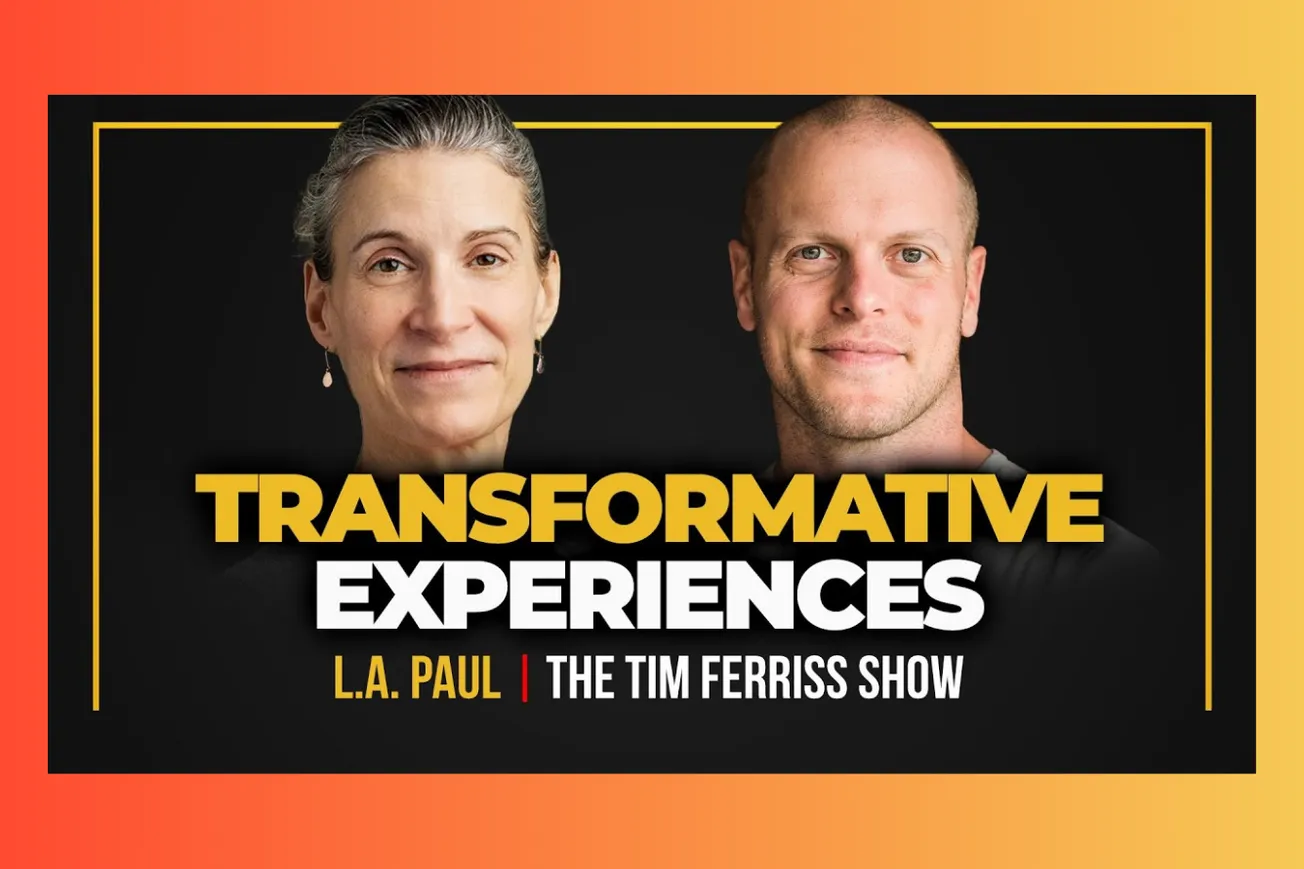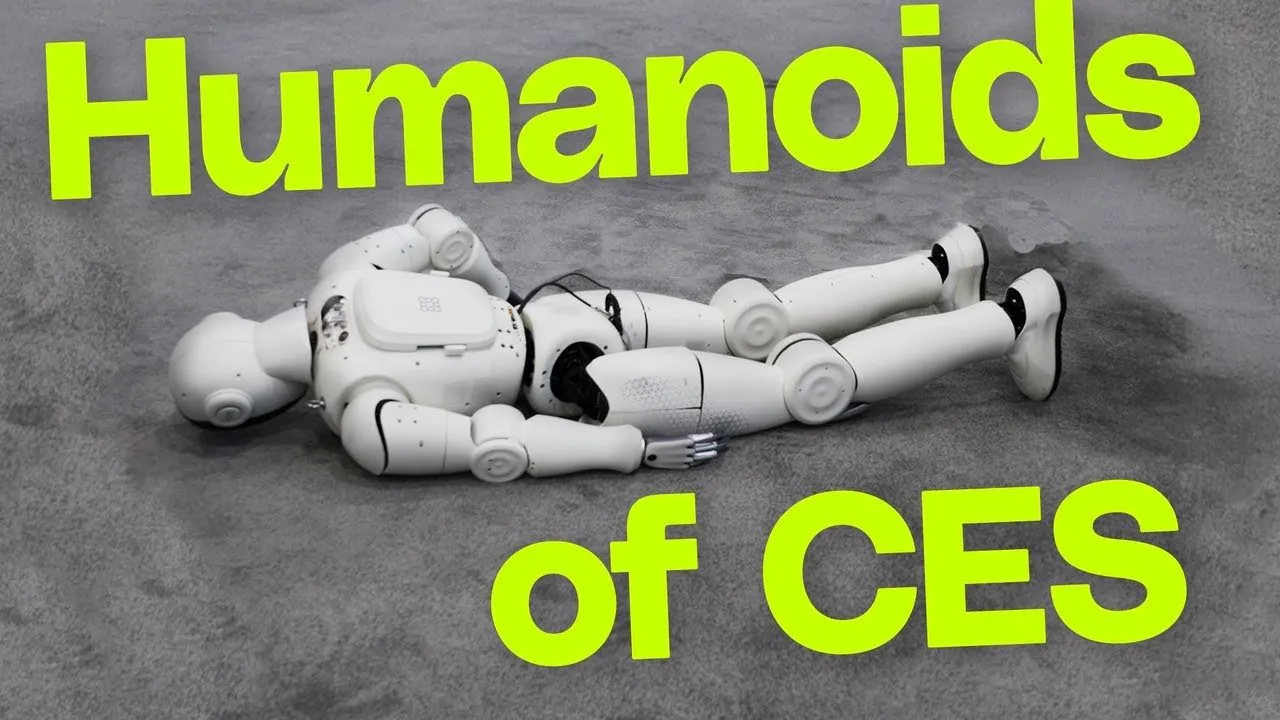Table of Contents
A Yale philosopher reveals why our most important life decisions—having children, changing careers, moving countries—cannot be made rationally, and what to do when you're forced to leap into the unknown.
Key Takeaways
- Transformative experiences fundamentally break rational decision-making models because you cannot assign values to outcomes when the experience will change who you are and what you care about
- The vampire thought experiment illustrates how becoming a parent, moving countries, or other major life changes create an "alien" version of yourself that your current self might not want to become, even if that future self will be happy
- Having children represents the classic transformative experience - you cannot understand what it's like beforehand, and the experience rewires your preferences so completely that you'd never trade your actual children for hypothetical alternatives
- Philosophy's greatest value lies in teaching conceptual frameworks for thinking clearly about fundamental questions, not just academic exercise but practical tools for navigating life's biggest decisions
- Failed early attempts at philosophy education often result from poor teaching that doesn't connect abstract concepts to meaningful human experiences and struggles
- The distinction between subjective time experience and objective time itself gets consistently conflated in popular culture, leading to confused thinking about consciousness and reality
- Psychedelics provide transformative experiences by revealing how much of our perceived reality is constructed by the brain, offering philosophical insights about the nature of consciousness and representation
- When facing inevitable cognitive decline, the Buddhist approach of consciously reconfiguring what you care about - rather than clinging to lost abilities - offers a framework for maintaining joy and meaning
- Reading fiction by authors like Ted Chiang, Jorge Luis Borges, and Lewis Carroll can provide philosophical insights more accessibly than traditional academic texts
The Accidental Philosopher: From Chemistry Labs to Conceptual Frameworks
- L.A. Paul's path to philosophy began with spectacular failures - she attempted philosophy classes twice as an undergraduate and dropped both after disasters involving unengaged teaching, massive lecture halls, and teaching assistants who dismissed her creative attempts to engage with the material.
- The breaking point in her chemistry career came during a gravimetric analysis class where months of painstaking laboratory work were destroyed when she accidentally brushed the side of a clay pot with her finger, contaminating the sample with skin oils. This existential crisis revealed that while she excelled at theoretical chemistry and problem-solving, the physical demands of laboratory work were fundamentally incompatible with her strengths.
- Her entry into philosophy happened through pure serendipity while working as a driver for Antioch College, picking up visiting speakers from the airport. During a 90-minute drive with philosopher Quenton Smith, she described her interests in understanding "who we are in the world" and thinking about time and points of view - leading Smith to immediately recognize her as a natural philosopher.
- Smith's recommendation to read Heidegger's "Being and Time" provided the intellectual framework she had been seeking, despite its notorious difficulty. More importantly, Smith offered to supervise her philosophical education through correspondence, leading to an unconventional degree-by-mail program.
- Paul's letter-writing campaign to three prominent philosophers involved offering each $250 for correspondence supervision (only one ultimately accepted payment). She would send 20+ typewritten pages every two weeks, working through their books chapter by chapter, receiving detailed responses that provided intensive philosophical training outside traditional academic structures.
- This unconventional approach demonstrated key advantages: flattering authors by seriously engaging their work, stress-testing interpretations through direct dialogue, and receiving personalized instruction that connected abstract concepts to specific intellectual problems that motivated her philosophical interests.
The Vampire Thought Experiment: When Becoming Someone Else Is Irreversible
- Paul's signature thought experiment involves Dracula offering you a one-time, irreversible chance to become a vampire while traveling through Romania. Vampires are immortal, powerful, and attractive, but you must sleep in coffins, avoid sunlight, and develop an appetite for blood that you will love despite finding it alien now.
- When you contact friends who have already become vampires, they report being ecstatically happy with their transformation but explain that as a mere human, you cannot possibly understand what vampire existence feels like - the meaning and purpose are "exquisite" but conceptually inaccessible to your current mind.
- This creates the central dilemma of transformative experience: you cannot make an informed rational choice because (1) you lack the conceptual apparatus to understand the outcome, and (2) the experience will fundamentally alter your preference structure, making your current values irrelevant to evaluating your future satisfaction.
- The vampire scenario parallels having children perfectly - parents universally report loving their children intensely and being unable to imagine trading them for anything, yet this testimony is unreliable because the process of having children rewires parental attachment in ways that make the experience inherently self-justifying.
- Paul's personal example illustrates this phenomenon: as a graduate student, she could barely wake up before noon, yet after having children she willingly got up at 4 AM daily for years to write before they woke up - a transformation she would have rejected as impossible and undesirable in her pre-parent state.
- The vampire thought experiment reveals how certain life decisions involve "stepping off the ledge into the deep" where rational calculation fails and "flailing might be the only response" because traditional decision-making frameworks assume stable preferences that transformative experiences necessarily violate.
Act-State Independence and the Breakdown of Rational Choice Theory
- Transformative experiences violate "act-state independence," a foundational axiom of rational choice theory that assumes the act you perform doesn't change the state (i.e., the type of person) you're in when evaluating outcomes.
- Under normal circumstances, trying new ice cream flavors maintains act-state independence because tasting vanilla versus chocolate doesn't fundamentally alter your identity or preference structure - you remain essentially the same person capable of evaluating whether you enjoyed the experience.
- Transformative experiences break this axiom because the act of having the experience simultaneously changes both your circumstances AND your identity/preferences. Having children doesn't just add children to your life; it creates a different version of yourself with altered values, priorities, and ways of understanding meaning.
- This breakdown means you cannot use standard decision-making models that assume you can "see through" options to assign them values and choose what maximizes your expected utility. When you don't know what version of yourself will emerge or what that version will value, expected utility calculations become meaningless.
- Paul's controversial solution reframes the choice: instead of asking "will I be happy if I have children?" (which assumes continuity of self), ask "do I want to discover what that new way of living would be like?" - accepting both the potential joys and inevitable suffering that transformation entails.
- This approach acknowledges that transformative experiences almost always involve significant suffering alongside their benefits, and that reasonable people can legitimately choose either to embrace transformation or to maintain their current way of being without either choice being objectively "wrong."
Philosophy as Life Navigation: Beyond Academic Masturbation
- Paul acknowledges that analytic philosophy often appears as "intellectual masturbation" that seems disconnected from practical concerns, but argues that rigorous conceptual frameworks are essential for thinking clearly about anything, including the most personal life decisions.
- Her approach pairs "the search for rigor with accessibility," drawing inspiration from her father who read popular science and believed in making intellectual activities accessible to broader audiences rather than keeping them confined to academic specialists.
- Philosophy's primary value lies in teaching people "how to think about things" by providing conceptual frameworks - determining what to take as fundamental, clarifying terminology, understanding what principles apply to what situations, and recognizing the implicit assumptions underlying our reasoning.
- The transformative experience framework exemplifies this practical application: by diagnosing why certain life decisions feel impossibly difficult, philosophy provides conceptual clarity that validates people's agonizing rather than dismissing it as overthinking or indecision.
- Paul teaches courses that demonstrate philosophy's relevance to computer scientists, cognitive scientists, and engineers working on artificial intelligence, showing how philosophical concepts like knowledge, understanding, and reasoning directly impact their technical work on machine learning and AI alignment.
- Rather than providing easy answers, philosophy's contribution involves "raising questions" and helping people recognize the conceptual structure underlying their confusion, which can be more valuable than false clarity that ignores genuine complexity.
Reading Recommendations: Philosophy Through Fiction and Thought Experiments
- For people intimidated by traditional philosophical texts, Paul strongly recommends Ted Chiang's science fiction, which explicitly explores philosophical concepts like counterfactuals, metaphysics, and the nature of time through accessible narratives that make abstract concepts concrete and emotionally resonant.
- Jorge Luis Borges offers another entry point, particularly "The Garden of Forking Paths" and "The Aleph," which present philosophical ideas about possibility, time, and reality in literary form that captures the intuitive content without requiring technical apparatus.
- The film "Arrival" (based on Chiang's story) and time travel movies like "Primer," "12 Monkeys," and "La Jetée" can spark philosophical curiosity about logical consistency, causation, and temporal paradoxes that motivate deeper investigation into formal philosophical frameworks.
- Lewis Carroll's Alice in Wonderland works function as sophisticated logical puzzles disguised as children's literature, introducing concepts about identity, meaning, and reasoning that appear simple but contain genuine philosophical depth.
- Paul's own book "Transformative Experience" was deliberately written with the first 100 pages accessible to non-philosophers, with the opening chapter only four pages long to allow people to grasp the core concept even if they don't continue with the technical argumentation.
- The Stanford Encyclopedia of Philosophy provides high-quality technical entries that can be processed through AI tools to extract key concepts, while Oxford's "Very Short Introduction" series offers expert-written accessible overviews of major philosophical topics.
Time, Free Will, and Popular Misunderstandings
- One of the most consistent philosophical errors in popular culture involves conflating subjective time experience with objective time itself - the difference between how long something feels versus how long it actually takes according to external measurement.
- Paul illustrates this with boring lectures that "feel like forever" despite lasting only 15 minutes, or car accidents that seem to occur in slow motion but actually unfold in seconds - demonstrating that our time perception and actual temporal duration are fundamentally different phenomena.
- Free will discussions particularly frustrate Paul when scientists attempt to "solve" the problem without engaging existing philosophical literature, leading to reinvention of arguments that have been thoroughly analyzed and refined over centuries of scholarly work.
- Continental philosophy (associated with thinkers like Heidegger, Foucault, and Derrida) differs from analytic philosophy (Russell, Wittgenstein, logical positivists) primarily in methodology and topics rather than geographic origin, with Continental approaches often incorporating psychoanalysis while analytic philosophy connects more closely to empirical science.
- Existentialism and phenomenology explore questions about the nature of being and consciousness that Paul finds deeply meaningful but methodologically challenging to address using the precise, scientifically-grounded approaches she prefers in her own work.
- The popular appropriation of philosophical concepts often strips away the careful distinctions and nuanced analysis that make them genuinely useful, leading to oversimplified self-help applications that miss the concepts' actual explanatory power.
Psychedelics and the Construction of Reality
- Paul views psychedelic experiences as paradigm examples of transformative experiences that reveal fundamental insights about consciousness and the constructed nature of perceived reality through direct phenomenological evidence rather than theoretical argument.
- The philosophical significance of psychedelics lies in demonstrating how much the brain contributes to constructing our experienced world - when neurochemical changes alter perception, we discover that our normal reality was one possible configuration among many rather than direct access to objective truth.
- This connects to longstanding philosophical problems about the relationship between mind and world: psychedelics provide experiential evidence that what we take to be straightforward perception actually involves complex representational processes that can be dramatically altered while maintaining coherent conscious experience.
- The ineffability of psychedelic experiences parallels other philosophical puzzles about consciousness, like trying to describe the experience of seeing red to someone who has never had color vision - certain types of conscious content resist linguistic description yet remain phenomenologically rich and meaningful.
- Paul suggests that psychedelic experiences can produce lasting epistemic shifts in how people understand themselves as conscious beings embedded in the world, potentially leading to more appreciation for the complexity of human-world relationships and greater attention to interpersonal connections.
- However, she emphasizes that having children, not psychedelic experiences, provided her primary philosophical insights about transformative experience - the domestic and reproductive rather than the exotic and pharmaceutical served as the crucial conceptual breakthrough.
Confronting Cognitive Decline: Buddhism and Preference Reconfiguration
- Paul identifies cognitive decline and dementia as the transformative experience she most fears, particularly given her identity as an academic whose intellectual projects form the core of her sense of purpose and meaning.
- Rather than approaching cognitive decline through denial or adaptive reasoning (convincing yourself you didn't really want what you're losing), Paul advocates for genuine preference reconfiguration based on Buddhist insights about attachment and suffering.
- The Buddhist approach suggests that suffering comes from attachment to specific outcomes and identities rather than from circumstances themselves - by consciously changing what you care about, you can maintain genuine happiness rather than settling for consolation prizes.
- Paul's strategy involves deliberately cultivating appreciation for more basic pleasures - art, music, food, relationships - while gradually releasing attachment to achievements, obligations, and complex intellectual projects that create stress and anxiety.
- This process requires treating cognitive decline as "permission to let go" of demanding aspects of life while rediscovering joy in simpler experiences, potentially finding community in assisted living facilities similar to enjoying dormitory life in college.
- The goal is authentic transformation rather than mere coping - actually becoming someone who values different things rather than someone who misses what they used to value, allowing for genuine satisfaction in a radically altered life rather than perpetual mourning for lost capacities.
The conversation reveals how philosophical thinking can illuminate the most personal and practical challenges of human existence, from parenting decisions to aging, while demonstrating that rigorous conceptual analysis and lived experience can productively inform each other rather than remaining in separate domains.





